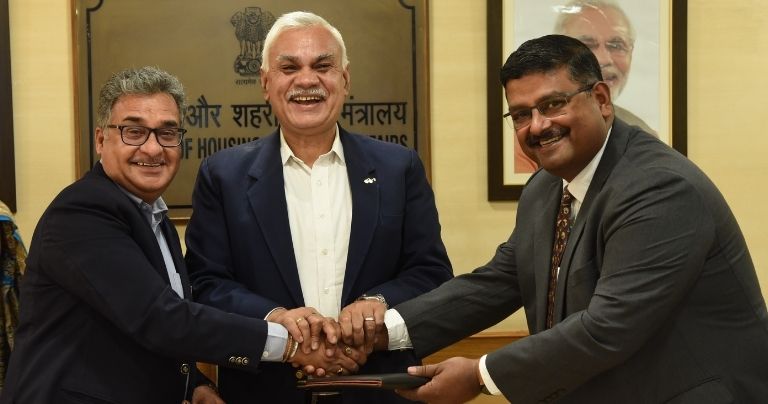Mahindra Lifespaces and TERI renew commitment for green building research
By Edit Team | November 24, 2021 3:24 pm SHARE

The launched guidebooks and toolkits will increase adoption of resource-efficient practices in India’s construction sector.
Mahindra Lifespaces® (‘MLDL’), the real estate and infrastructure development arm of the Mahindra Group, and The Energy and Resources Institute (‘TERI’) published key findings from five years of research on resource-efficient buildings, materials and technologies tailored to Indian climates and conditions. Led by a team of experts at the Mahindra-TERI Center of Excellence (CoE), a first-of-its-kind joint research initiative between Mahindra Lifespaces and TERI, these findings comprise guidebooks and toolkits. Mahindra Lifespaces and TERI also announced the commencement of Phase-2 of research efforts at the CoE, which will continue to focus on developing science-based solutions for India’s construction industry.
Delivering the keynote address at the event, Durga Shanker Mishra, Secretary, Ministry of Housing and Urban Affairs (MoHUA), Government of India reiterated the importance of collaboration between industry and researchers to develop integrated solutions for all aspects of sustainability, efficiency and comfort in the built environment. He added that the state-of-the-art Mahindra-TERI Centre of Excellence is a commendable step towards making available credible data to support the development of resource-efficient buildings and homes that protect the environment and enhance the quality of life for users.
| Focus areas of research at the Mahindra-TERI CoE | Benefits/Application |
| Standardisation and measurement of building materials: •More than 150 new and existing materials have been tested for their thermal properties. •Online, open-source database and tool developed to assess the thermo-physical properties of various walling and roofing materials and assemblies. |
•Makes available validated data on materials to build thermally comfortable buildings •Supports reduced energy consumption in buildings •Enables improved user comfort and wellbeing |
| Building envelope studies: •Wall and roof insulation •Sky scanner and solar monitoring unit installed – first-of-its-kind study to monitor sky conditions in Gurugram•Fenestration systems |
•Generates realistic simulations required to predict sky conditions, daylight use, and energy use patterns inside buildings •Aids in the design of buildings and homes that can use maximum natural light |
| Thermal and visual comfort studies: •Published thermal comfort and daylighting systems guidelines •Developed Eco-Niwas Samhita Design Aider Tool to ease the implementation of India’s Energy Conservation Building Code (ECBC) for residential buildings |
Aids in the design and construction of energy-efficient homes and buildings |
| Water conservation and management in the built environment: •Launched water sustainability assessment reports for Gurugram, Pune and Chennai •Conducted ‘rapid water audits’ •Developed web-based ‘Rainwater Management and Design Calculator’ for storage and groundwater recharge |
Helps identify areas for improving water efficiency in buildings, homes and townships |
Arvind Subramanian, Managing Director & CEO, Mahindra Lifespace Developers Limited, added, “With much of India’s future building stock yet to take shape, the real estate industry can play a critical role in meeting our country’s Net Zero goals and SDG commitments, while at the same time crafting buildings designed for superior user comfort and well-being. We are delighted to continue our partnership with TERI to support the widespread adoption of resource-efficient design and construction practices. The Mahindra-TERI Centre Excellence will continue to work towards bridging the gap in publicly available data, tools and guidelines to support the development of green buildings in India.”
In her remarks at the launch event, Dr. Vibha Dhawan, Director General, TERI, said, “The Mahindra-TERI CoE exemplified our focus on sustainability beyond just business-towards creating a resilient and livable ecosystem empowering a transformative ‘greener urban future’ across India’s built environment.”
The event also kick-offed the project “Multi-pronged Approach to Promote Use of Energy Efficient Glazing in Indian Context”. This project is envisaged under the aegis of MoU signed between TERI and Glazing Society of India (GSI) in February 2021.
In his special address, A.R. Unnikrishnan, Chairman, GSI, said, “It is essential to increase the awareness, build simplified tools and train the entire construction value chain for the right selection and use of energy-efficient glass in buildings as per the Indian energy codes and standards. Initiating this exercise from affordable housing would be an ideal platform to showcase the increased energy efficiency of buildings with the use of the right glass and to ascertain occupant comfort. The TERI – GSI project kick-off would provide a larger momentum and benefits to the consumers in understanding and selecting the energy-efficient glass for the buildings”.
Research at the Mahindra-TERI CoE is aligned to multiple Sustainable Development Goals (SDG) adopted by the United Nations – SDG 13 on climate action; SDG 7 on clean and sustainable energy; and SDG 6 on sustainable water use. The Mahindra-TERI CoE has generated interest from researchers, students, government institutions, academia, and industry globally. The University of New-South Wales, Sydney, has signed an agreement with TERI for testing the thermal properties of materials developed in its research lab at the CoE. Industry partners such as Asahi India Glass Ltd. (AIS) will help augment the testing capabilities of the Mahindra-TERI CoE with equipment for testing transparent materials such as glass.
Cookie Consent
We use cookies to personalize your experience. By continuing to visit this website you agree to our Terms & Conditions, Privacy Policy and Cookie Policy.




































-20240213125207.png)

























